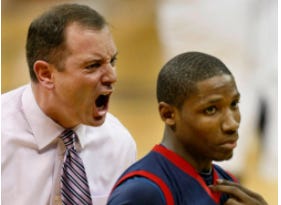It Is A Slippery Slope When Coaching Our Youth is Riddled With F-Bombs!
The standards seem to be low when it comes to communicating with our youth. Does anyone else see an issue with berating our youth aka bullying as a coach? 5 ways to get back on track.
It was a hot, humid night in the gym.
During warmup the kids’ shirts were drenched. A few wore masks due to Covid concerns which did not help fight off the heat for sure.
The 2 teams warming up looked approximately grade 9 or 10 age bracket, so under 16 years old.
It was fun to see team playing again, competing and athletes excited for this summer league game.

It is a smallish gym with very little seating, but I managed to get a vantage point on the 2nd floor. It was a perfect spot to view the action.
Side note: I had no connection or stake in the game. Did not know anyone on the floor and not involved with the program running the game at all. I was at the facility for another activity and stumbled upon the game.
I love basketball. I only played casually growing up but learned to love it during my post-secondary days, learned a ton as part of my undergrad, taught it for years across multiple age groups. I went on to coach through to senior high school age groups during my teaching days. In fact for 1 year, I was a basketball referee covering similar age groups as my coaching. I say this only because I want to share that I have more than a little experience in the game, as a coach and referee.
Now that I have set the table, I want to describe what I saw for the next 20 minutes of this summer game. Game started. 16u boys summer league game. Here we go.
Within the first 5 minutes, Coach of the blue team coughed up, without exaggeration, 2 f-bombs per minute toward his team and players.
“Play f**in tighter D”!
“Get your f**in hands up Johnny (not real name)”!
And this went on for quite a while.
Up and down the court. The coach was off the bench, on the edge of the court berating his players and correcting at every turn with more than a little salt in the language.
At the 10 minute mark, coach yelled “get the f** off the court Danny!”, (not real name) “if your going to play defense like that!”
When Danny got to the bench, he told him loud enough for everyone to hear : “sit down for a while”
Ouch!
I have thought a lot about this stretch since the evening in question about a month ago.
So much so that I have been back to observe more. This time was younger. 14 and under likely. Much better. A lot of yelling, but all clean and the coaches were focused on the game and trying to help the kids through the right path.
In recent years, I have done more parenting than coaching in following my son’s aspirations in moving up the Baseball levels (through to college now).
In 2014, we agreed with my son’s request to try out for one of the top baseball programs in the country. Our first foray into the world of privatized youth sports. He was 14 at the time and he wanted to try the next level. The tryout went well, it was very good ball and they asked him to join the program. What stopped us was the very noticeable use of the f** bomb at every during.
The tryout brought together teams at 17u, 16u and 14u into 1 massive series of practices for about 70 kids total.
The drills were solid and learning opportunities strong. He benefitted in many ways from the weeklong practices.
But his mom and I could not get past this head coach swearing his head off at the kids.
This kind of commitment to a program is life changing. Long trips to USA , major expense, exclusion of any other activities are just a few of the sacrifices. This was big enough and could be justified if this is really what the kid wanted. However, it begs the question if we were ready to leave our son under the supervision of this massive man with the big bellow and a love affair with the f-bomb?
The answer was no. He did not join the program.
We did not feel this was necessary to pursue baseball at higher levels, which is what our son wanted. When asked about the language before our family decision, our son said it was a little worry some and intimidating. That was enough for us.
(I am happy to say our son has gone on to play baseball on multiple teams with multiple organizations over the years, still has a strong love of the game and is starting his first college baseball season in a couple of weeks. We still don’t feel the profanity is necessary in grooming young athletes!).
Now, some might say the coach is preparing the kids for play at the higher level. I call B.S. on that. I don’t think it is needed, beneficial and it needs to be called out. I am pretty sure that the intimidating use of the f-bomb serves no positive purpose at all.
As you can see, this topic has been on my mind for a while. I first observed it in 2014. I did not observe this in coaching and refereeing basketball or baseball over the years. But something happens when the boys hit 16, I think. I have not experienced this in coaching girls. But with the boys, maybe it is because it becomes part of their vocabulary, coaches feel it is the best communicate at their level?
I have wrestled with where the standards are in communicating with teenage athletes.
Are they slipping?
I can’t help but having underlying concerns and questions with this type of communication:
My underlying questions are as follows?
· What are the kids learning with this style of communication? Any of it good?
· How many kids are being turned off the game as opposed to being inspired (reference low participation rate after 14 years old in youth sports).
· What are the standards for this coach or others? Where is the line drawn on how to communicate and by whom?
· Do parents and league organizers think this is necessary for kids today to learn? (The few parents who were watching seemed to feel it was all good based on their reaction).
Coaching is a skill. A good coach is a leader, who supports, teaches and guides his/her students in the development process. Yes?
So I combined some interweb research with 30+ years of coaching and parenting experience to come up with 5 points that can raise the standards on coaching communication with our youth:
1. Coaching is a skill. It is developed by doing, trial and error and by learning. Somewhere along the line the above examples had coaches who felt this was an acceptable way to communicate.
2. A good coach builds strong relationships with players. This is build through honest communication. Questions and showing interests in their lives, not by berating their effort.
3. While a coach needs some basic knowledge of the sport itself, physiological and biomechanical requirements being an asset as well as strategy and rules; a good coach is one who connect with their players. They relate to them.
4. A good coach will educate their athletes. Instead of berating their f**in’ effort on defense, show them how. Teach them footwork via drills that allow them to learn proper motor patterns. In baseball, it is an absolute crime to berate effort on every turn when technique and a quiet mind are critical for successful performance.
5. A little vulnerability goes a long way. Find me a coach who has all the answers, and I will show you a not very good coach. Good coaches are curious and inquisitive. They are learners. They live their craft. They are passionate. They are secure in their skills. And while this may apply to the individuals in the above examples, their communication skills are inappropriate.
There is enough research and information available that coaches, parents and associations can take the initiative in raising the standards in our coaching communication.
So much is already spent on educating coaches, it seems a crime that few have enforced a standard on appropriate communication. And yes, this would include finding the proper words when letting the athletes know that their performance could be better or has fallen short. This is part of coaching.
As always, your feedback is appreciated. Are these the rants of an over the hill 56 year-old father and coach?
Or, are their legitimate concerns with how our coaches should be talking to our athletes?





